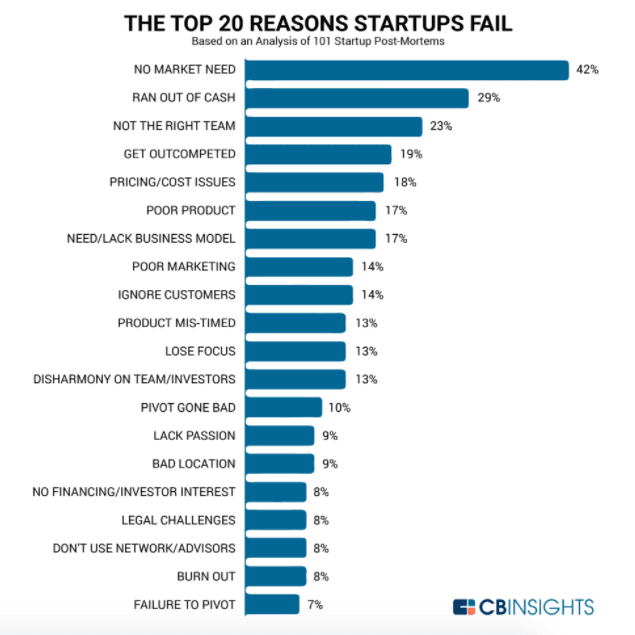
Simon Jenner
Tuesday 8 September 2020

Don’t let your MVP fail! Learn 3 essential steps to identify a solid market need, outsmart competitors, and build a product the world truly wants.
Posted in:
Startups
The biggest reason for startups to fail is lack of market need (42%).
Though you may have had your lightbulb moment and fallen in love with your idea, it doesn’t mean the rest of the world will agree. You could spend months lovingly building your MVP app, only to have it flop at launch.
Identifying your market need is definitely one of the most important things you can do, yet it is side-stepped by far too many new founders.
Here are our three steps to identifying a solid market need for your brand new MVP app:
1. Research your industry
Break down your industry into segments, and analyse each one. Ask yourself these questions:
Which areas of the industry are growing, and which are shrinking? Are there any emerging customer types? How is technology affecting the industry? Are there any recent or upcoming changes in legislation that will affect the industry?
Look for the thriving parts of the industry and focus your new business here; aiming to revive a declining segment is a plan that’s doomed to failure.
2. Examine your opportunity
In most cases, the current market will dictate your success. Find out:
Revenue for your market: locally, regionally and nationally;Who the big players are, and their market share How much is left after this share is taken away
Let’s imagine you’re planning to sell shoes online. If you know the shoe retail industry in your country is static at £1m, and there are already 5 big shoe retailers taking 90% of the market share, is it really worth battling over the remaining £100k?
Or look at it differently, could your MVP app take advantage of one of the new trends or technologies available and carve out a new niche? Can you offer something new to the online shoe retail market?
3. Dive deeper into competitors
One of the best things you can do is look at the strategies and operations of your key competitors.
Look at their individual microeconomic strengths and weaknesses, and plot them against the macroeconomic forces at play - the opportunities and threats.
Try to find answers to the following questions:
What is their headcount? What is their annual turnover?What else do their annual reports say?What were their big wins in the last 12 months?What are their big sellers? Are they spending money on paid advertisements? What is their social media and website like?How is their app UX? Are there any strategic alliances? What does the press (both industry-specific and general) say?
If, after following these three steps, you are still confident there is a market need, you will be one step ahead of those other 42% and a big leap further towards the success of your MVP app.
Though you may have had your lightbulb moment and fallen in love with your idea, it doesn’t mean the rest of the world will agree. You could spend months lovingly building your MVP app, only to have it flop at launch.
Identifying your market need is definitely one of the most important things you can do, yet it is side-stepped by far too many new founders.
Here are our three steps to identifying a solid market need for your brand new MVP app:
1. Research your industry
Break down your industry into segments, and analyse each one. Ask yourself these questions:
Which areas of the industry are growing, and which are shrinking? Are there any emerging customer types? How is technology affecting the industry? Are there any recent or upcoming changes in legislation that will affect the industry?
Look for the thriving parts of the industry and focus your new business here; aiming to revive a declining segment is a plan that’s doomed to failure.
2. Examine your opportunity
In most cases, the current market will dictate your success. Find out:
Revenue for your market: locally, regionally and nationally;Who the big players are, and their market share How much is left after this share is taken away
Let’s imagine you’re planning to sell shoes online. If you know the shoe retail industry in your country is static at £1m, and there are already 5 big shoe retailers taking 90% of the market share, is it really worth battling over the remaining £100k?
Or look at it differently, could your MVP app take advantage of one of the new trends or technologies available and carve out a new niche? Can you offer something new to the online shoe retail market?
3. Dive deeper into competitors
One of the best things you can do is look at the strategies and operations of your key competitors.
Look at their individual microeconomic strengths and weaknesses, and plot them against the macroeconomic forces at play - the opportunities and threats.
Try to find answers to the following questions:
What is their headcount? What is their annual turnover?What else do their annual reports say?What were their big wins in the last 12 months?What are their big sellers? Are they spending money on paid advertisements? What is their social media and website like?How is their app UX? Are there any strategic alliances? What does the press (both industry-specific and general) say?
If, after following these three steps, you are still confident there is a market need, you will be one step ahead of those other 42% and a big leap further towards the success of your MVP app.
Ready to launch your startup idea with an MVP?
Download our step by step guide for non-technical founders to create a startup Minimum Viable Product (MVP)
Get the eBook

